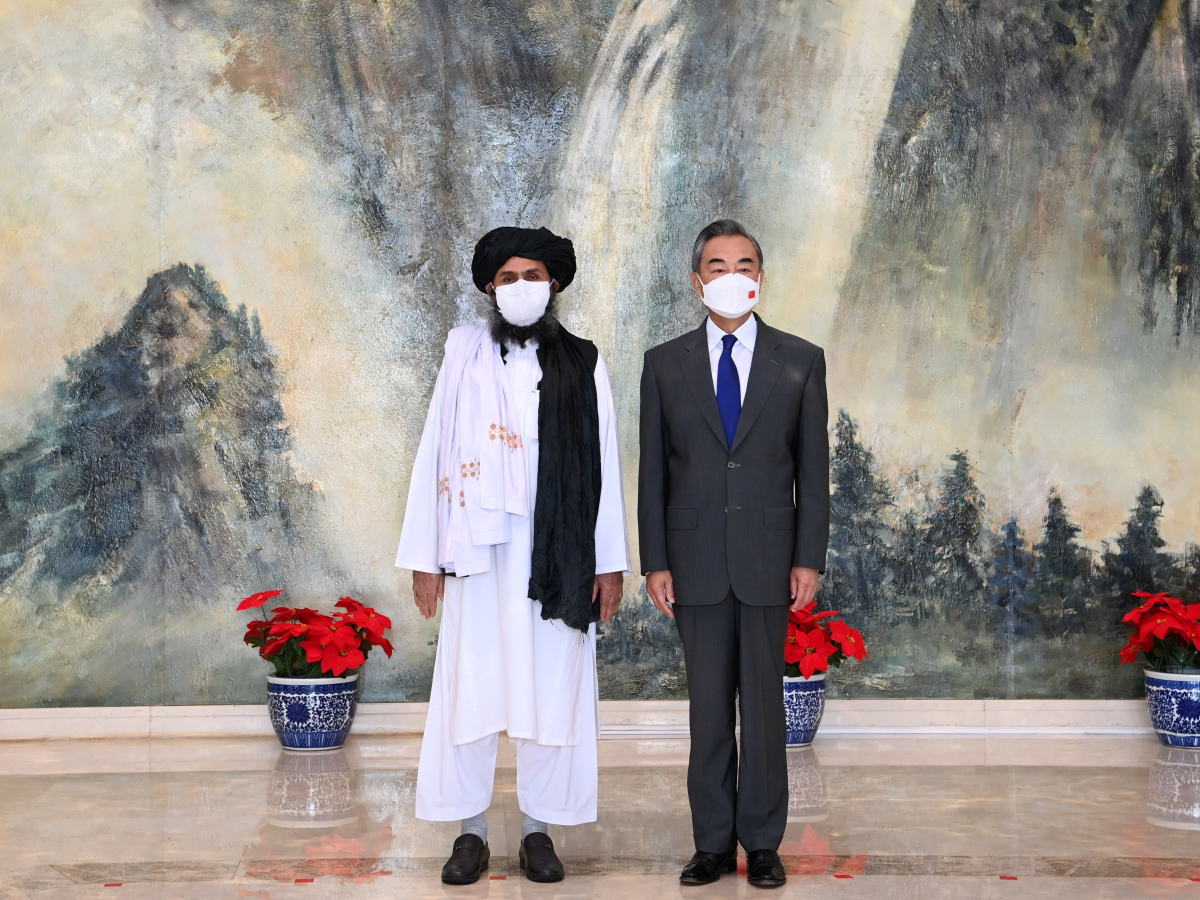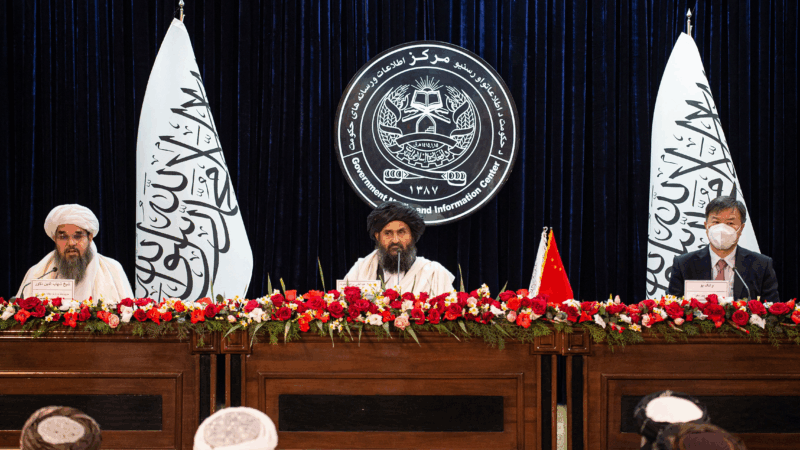Contract breach or banditry? Inside the collapse of the Taliban’s oil deal with China
Turbaned Afghan officials and hard-hatted Chinese engineers gathered in Afghanistan’s Sar-e-Pul province in 2023, to mark the opening of Chinese-invested oil fields.
The fields are located in the Amu Darya River basin, a major Central Asian watershed that includes glacier-capped mountains and vast, arid deserts.
At a signing ceremony in Kabul, China’s envoy, Wang Yu, hailed the deal as “an important project” between the two countries. It was the first — and at the time, only — foreign investment in Afghanistan since the Taliban took back power in August 2021.
Under the 25-year-contract, China pledged to invest $540 million in the first three years.
“The contract specifies that the oil will be processed in Afghanistan,” noted Afghanistan’s then-Acting Minister of Mines and Petroleum Shahabuddin Delawar. “We will not allow crude oil to be processed or transported abroad.”
But two years later, the deal collapsed amid mutual recriminations — in a saga that sheds light on the often-opaque relationship between Beijing and the Taliban.
Afghan officials complain of breach of contract
Afghan officials accused the Xinjiang Central Asia Petroleum and Gas Company, the Chinese company that had signed the 2023 deal, of breaching the contract, while some Chinese employees with AfgChin Oil and Gas Ltd., the joint venture that ran the oil wells, likened the Taliban’s actions to “robbery.”
In June, the Taliban announced the termination of the contract, claiming that the Chinese firm had repeatedly violated it. Hamaun Afghan, spokesperson for Afghanistan’s Ministry of Mines and Petroleum, the decision was approved by the Taliban’s Prime Minister Mullah Mohammad Hassan Akhund.
The ministry said the Chinese side didn’t deliver its promised investments on time, didn’t pay royalties or finish promised geological surveys and infrastructure projects. It added that the Chinese company had not responded to their complaints.
But Chinese employees say the Taliban forcibly took over the joint venture and “unreasonably drove our Chinese personnel out of the oil field at gunpoint,” according to one of the employees.

Three Chinese sources — including two Chinese employees and the spouse of a third — and one Afghan source, all with direct knowledge of the matter, say that the Taliban then confiscated the passports of a dozen Chinese employees, effectively barring them from leaving the country.
All four sources requested anonymity, citing fears of retribution from both the Chinese government and, for those still in Afghanistan, the Taliban.
NPR has obtained a list from AfgChin that contains the names and passport numbers of the 12 detained Chinese employees.
Afghanistan’s Ministry of Mines and Petroleum did not respond to repeated requests for comment.
Liu Pengyu, the spokesman for the Chinese Embassy in Washington, D.C., said he was “not familiar with the specific situation” but said that China attaches high importance to protection of its citizens overseas. China’s Foreign Ministry has not responded to NPR’s request for comment.
The Chinese sources say their colleagues were confined to the offices of AfgChin in Kabul, guarded by General Directorate of Intelligence (GDI) agents, and not allowed to leave without permission. The Afghan source tells NPR that the Taliban consider it a ban on exiting the country and not a form of house arrest.
Following a visit by Chinese Foreign Minister Wang Yi to Afghanistan last week, the Taliban returned passports to nine of the Chinese nationals. Eight of them have since returned to China, according to the same Chinese sources.
At least three employees, these sources say, are being kept by the authorities in Kabul to process the handover of the joint venture to the Taliban.
But the Afghan source says they will not be allowed to leave until the dispute is over. However, he notes that because Afghanistan lacks a formal mechanism for resolving such disputes, it is unclear how long they will have to remain in the country.
The wife of one of the detained Chinese employees, who was among the eight to leave Afghanistan last week, told NPR before his release that her husband had suffered from stress and was running out of medication for diabetes and high blood pressure.
“Please give them back their passports quickly,” she pleaded. “They’ve been detained for so long, our people have suffered severe physical and mental harm. They’re of no use to you there.”
The two Chinese employees NPR spoke to say the Afghan side of the joint venture is now running the oil wells, but with reduced output and without adequate technical expertise or safety procedures.

Chinese accuse the Taliban of “bandit”-like behavior
One of the Chinese sources says that the Afghan Ministry of Mines delivered a private verbal message to the company’s management, offering a deal.
“‘You give us a written pledge, saying that you’re voluntarily terminating the contract. We’re not forcing you to do it,” the source says, describing the message. “‘Secondly, you voluntarily leave all your equipment and assets in Afghanistan to us.'”
The third demand was that the Chinese side hand over to the Taliban their Kabul bank account, which held millions of dollars. “If you do these three things, I reckon you’ll get your passports back quickly,” the source recalls the message as saying.
“That’s when we realized our 12 people were essentially being held hostage,” the source says.
The Chinese sources say the oil fields were producing up to around 12,000 barrels of oil a day, creating thousands of jobs and millions of dollars in tax revenue for the Afghan government.
“We had hoped that we could help them [Afghanistan] develop, improve citizens’ lives, and help their interim government to function and be stable,” said one of the Chinese sources. “Their stability is good for China, and its Xinjiang region,” which borders eastern Afghanistan and has long been a major security concern for Chinese authorities.
But not everyone on the Afghanistan side was satisfied with Chinese efforts, the number of jobs created or the oil sales revenue, the source argued.
“Their business mindset does not include win-win outcomes,” he says. “They think whatever they say goes. Like a bandit committing a robbery, they think: ‘If I like it, then it’s mine.'”
He says the Chinese wrongly believed that the Taliban would honor the pledges they made when they came to power to respect international law, human rights and investors’ interests.
The overall China-Taliban relationship has not been derailed
After the U.S. withdrew from Afghanistan four years ago, China quickly moved to fill the vacuum left by the Americans. Both Afghanistan’s mineral resources, estimated to be worth more than $1 trillion, and its strategic location — bordering China’s Xinjiang region — are among top priorities for Beijing.
But the oil field fiasco underscores the challenges China faces in achieving its goals. And for the Taliban, the lack of rule of law and international sanctions continue to pose major obstacles to attracting foreign investment and developing domestic industries.
Still, both Beijing and Kabul appear to be trying to keep their larger relationship on track.
“I think that both sides, not just the Afghans, may want to be a bit more sober about this,” says Omar Samad, a former Afghan diplomat, “and realize that this one particular deal may jeopardize overall relations, if it’s not handled properly.”
According to China’s Foreign Ministry, Foreign Minister Wang Yi said in Kabul last week that China would continue to support Afghanistan in achieving lasting peace and stability.
Wang also suggested that Afghanistan should crack down on the East Turkestan Islamic Movement, a separatist group seeking to build an independent state including parts of Xinjiang which has historically received Taliban support.
This is not the first Chinese investment in Afghanistan to hit snags. Another big project, the Mes Aynak copper mine in Logar province, has been delayed for nearly two decades by everything from security concerns and contractual disputes to saving archaeological treasures from an ancient Buddhist city situated atop the copper deposits.
After canceling the Chinese contract, Afghanistan’s government invited other international oil companies to invest in the Amu Darya Basin oil fields. But the Chinese employees warn that unless the Taliban treat foreign investors with more respect, they are likely to stay away.
Transcript:
ARI SHAPIRO, HOST:
Four years ago this month, the Taliban regained control of Afghanistan and the U.S. withdrew. Chinese investors quickly stepped in as Kabul faced Western sanctions. Their first major investment was in oil fields, but that deal recently fell apart. The Taliban and the Chinese company are trading accusations at each other. As NPR’s Anthony Kuhn reports, the saga sheds light on the often opaque relationship between Beijing and the Taliban.
(SOUNDBITE OF ARCHIVED RECORDING)
UNIDENTIFIED COMMENTATOR: (Speaking in non-English language).
ANTHONY KUHN, BYLINE: In 2023, Afghanistan’s Ariana TV network news showed turbaned officials and hard-hatted engineers turning on oil wells in northern Afghanistan’s Amu Darya River Basin. China and Afghanistan signed a 25-year contract to produce oil with China pledging to invest $540 million in the first three years. But after 2.5 years, the deal fell apart, with both sides blaming each other. Two Chinese employees of the joint venture, Afg-Chin Oil and Gas Limited, spoke with NPR. They requested that we not use their names or voices because they feared retribution from the Chinese government and the Taliban. We use voice actors to read their quotes. One employee explained what happened to his colleagues in June.
UNIDENTIFIED VOICE ACTOR #1: (As employee #1, reading) The Taliban forcibly took over our joint venture oil fields and unreasonably drove our Chinese personnel out of the oil field at gunpoint.
KUHN: He says the Taliban detained 12 Chinese employees in Kabul and confiscated their passports. In June, Afghanistan’s Ministry of Mines and Petroleum said it was canceling the contract because the Chinese side didn’t deliver promised investments or pay royalties on time. The Chinese company disputes this account. Their employee said the Ministry of Mines sent them a private verbal message offering a deal.
UNIDENTIFIED VOICE ACTOR #1: (As employee #1, reading) They told us, you give us a written pledge saying you’re voluntarily terminating the contract and we’re not forcing you to do it.
KUHN: He says that they also demanded that the Chinese side leave them all their equipment and their Kabul bank account with millions of dollars in it.
UNIDENTIFIED VOICE ACTOR #1: (As employee #1, reading) If you do these three things, I reckon you’ll get your passports back quickly.
KUHN: The Ministry of Mines and Petroleum did not respond to repeated requests for an interview. One Afghan source with direct knowledge of the situation confirmed that Chinese employees’ passports were confiscated, but denies they were detained. He requested that his name and voice not be used because he wasn’t authorized to speak to the media.
(SOUNDBITE OF JET FLYING OVERHEAD)
KUHN: After the U.S. withdrawal four years ago, China was the first country to appoint an envoy to Afghanistan. A second Chinese employee said his company did not invest in Afghanistan just for financial gain.
UNIDENTIFIED VOICE ACTOR #2: (As employee #2, reading) We had hoped that we could help them develop, improve citizens’ lives and help their interim government to function and be stable. Their stability is good for China and China’s Xinjiang region.
KUHN: Xinjiang borders eastern Afghanistan. The second employee says the oil fields created thousands of jobs and millions of dollars in revenue for the Afghan government, but the Taliban was still not satisfied.
UNIDENTIFIED VOICE ACTOR #2: (As employee #2, reading) Their business mindset does not include win-win outcomes. Like a bandit committing a robbery, they think, if I like it, then it’s mine.
KUHN: Last week, the two employees told NPR the Taliban let eight Chinese employees return to China while four remain in Kabul, and it’s not clear when they’ll be able to leave. This happened as Chinese Foreign Minister Wang Yi was visiting Afghanistan. The Chinese embassy in Washington said they were not aware of this case but attach importance to protecting Chinese nationals overseas. Former Afghan diplomat Omar Samad says both countries need to protect their long-term interests in good relations.
OMAR SAMAD: I think that both sides, not just the Afghans, may want to be a bit more sober about this and realize that this one particular deal may jeopardize overall relations if it’s not handled properly.
KUHN: Afghanistan says it’s open to partnering with other foreign investors to operate the Amu Darya oil fields. But the Chinese employees warned that unless the Taliban treat foreign investors better, they’re unlikely to find any new partners.
Anthony Kuhn, NPR News.
In pictures: Winter storm slams the east coast
Photos of cities in Connecticut, New York, New Jersey and Massachusetts as they cope with a powerful winter storm.
The FDA creates a quicker path for gene therapies
The Food and Drug Administration aims to evaluate treatments for rare diseases based on plausible evidence that they would work — without requiring a clinical trial first.
BAFTAs apologize after guest with Tourette syndrome uses racial slur during ceremony
A man with Tourette syndrome shouted a racial slur and other offensive remarks during the BAFTA awards ceremony Sunday. The BBC did not edit out his outbursts in its delayed broadcast.
‘Everything was in pieces:’ Lindsey Vonn describes grueling surgery on broken leg
In a recent video, the Olympic skier credits her surgeon with saving her leg from potential amputation.
A new lawsuit alleges DHS illegally tracked and intimidated observers
Observers watching federal immigration enforcement in Maine who were told by agents they were "domestic terrorists" and would be added to a "database" or "watchlist" are now part of a new federal class action lawsuit.
Kate Hudson on regret, rom-coms and finding a role that hits all the notes
Hudson always wanted to sing, but feared it would derail her acting career. Now she's up for an Oscar for her portrayal of a hairdresser who performs in a Neil Diamond tribute band in Song Sung Blue.








